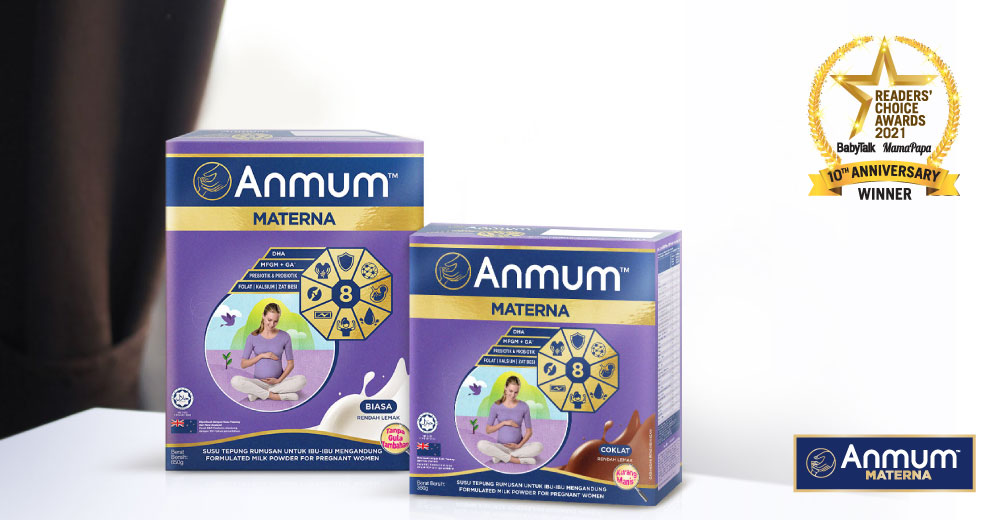Anmum™ MATERNA: The Only Prenatal Milk With No Added Sugars#. Support 100%^ of Pregnancy Nutritional Needs

According to studies, 9 out of 10 Malaysian pregnant mums are not getting sufficient folate, calcium and fibre[1],[2]. This calcium insufficiency from dietary intake could be further worsened as only 25.6% of pregnant mums get enough vitamin D[3], which is required for the body to absorb calcium[4]. In addition, not all Malaysian pregnant mums are getting adequate amounts of iron to support their pregnancy[2].
Anmum™ MATERNA, the No. 1 Prenatal Milk brand in Malaysia* is scientifically formulated to include key nutrients to support the nutritional needs of Malaysian pregnant women. Nutrients such as Folic acid and Calcium are important to support foetal growth and development while maintaining or developing strong bones and teeth for both mother and foetus.
Pregnant women have higher nutritional requirements. A more convenient way to get nutrients needed to support pregnancy is by consuming maternal milk as part of a well-balanced diet.
Anmum™ MATERNA supports 100% of pregnancy nutritional needs^. It’s backed by Fonterra’s Research and Development centre in New Zealand which has more than 90 years of science research and expertise.
There are 8 important aspects of pregnancy to be considered. Anmum™ MATERNA combines DHA, MFGM + Gangliosides (GA), Prebiotic, Probiotic Bifidobacterium lactis HN019 (DR10™) and other key nutrients, including folate, calcium and iron, all of which are beneficial for expecting mothers and developing foetus. Apart from the addition of prebiotic and probiotic to help support the body’s digestive and defence systems. Anmum™ MATERNA is also low-fat, low-GI, and the only maternal milk that does not contain any added sugars#.
According to Dr Chuah Bee Poh, Consultant Obstetrician & Gynaecologist from Sunway Velocity Medical Centre, an adequate intake of nutrients during pregnancy helps to reduce the risk of maternal morbidity, including anaemia, unhealthy gestational weight gain, gestational diabetes mellitus (GDM), preeclampsia, preterm delivery and miscarriages[5]."
There is research finding to show that maternal malnutrition may have long-lasting programming effects on the risk of developing non-communicable diseases later in life[6]. “One important micronutrient for pregnant women is folic acid. Foetal growth causes an increase in the total number of rapidly dividing cells, leading to higher folate requirements needed for healthy foetal development. Folic acid is important for the foetus’ growth and development including the neural tube. Folic acid helps the body break down, use and create new proteins, which are our cells’ building blocks. It also plays an important role in DNA creation and red blood cell formation,” he explained.
Dr Chuah also stressed the importance of adequate calcium intake for expecting mums: “During pregnancy, your body needs to provide calcium to your foetus to aid the development of vital structures like the skeleton, in addition to repair and replenish your bones and teeth. If your calcium intake is insufficient, the calcium given to your foetus would come from your bones and teeth – so if you want your bones and teeth to stay strong during and after pregnancy, you’ll need to achieve adequate calcium intake. Calcium intake from 2 glasses of ordinary fresh milk will only fulfil around 50% of daily pregnant mom requirement. Therefore, it’s best to take fortified maternal milk.”
At the same time, prebiotic and probiotic also help to improve overall health and wellbeing, especially for digestion and nutrient absorption. “Scientists have conducted extensive research into the potential of prebiotics and probiotics to help in restoring a good balance of good bacteria in the gut. This, in turn, can help us, including pregnant women, to have a good gastrointestinal environment,” shared Dr Khamsiah Muda, an Obstetrician & Gynaecologist and the founder of ANDORRA Women & Children Hospital.
2 glasses of Anmum™ MATERNA contains the equivalent level of folate from 17 oranges, calcium from 4 cups of fresh milk and zinc in seven (7) pieces of salmon fillet. On top of that, Anmum™ MATERNA is also formulated with MFGM, Gangliosides (GA), DHA, prebiotic & probiotic Bifidobacterium lactis HN019 (DR10™). With the increased nutritional needs during pregnancy, it is crucial to support the 8 important aspects of pregnancy.
Anmum™ MATERNA is available at major hypermarkets, supermarkets and stores nationwide, as well as online via Anmum™ MATERNA, LACTA & Essential Official Stores on Lazada or Shopee. You may also get your free Anmum™ MATERNA sample HERE.
Anmum™ MATERNA has emerged as the winner for the category of Prenatal Milk, in the recent BabyTalk Readers’ Choice Awards.
*No. 1 in value in Total Peninsular Malaysia in Health Food Drinks Category. Based on Retail Audit for Health Food Drinks Category for the 12 months ending April 2021 in Total Peninsular Malaysia (Copyright © 2021, The Nielsen Company (M) Sdn Bhd)
^For Folic Acid, Calcium, Zinc, Vitamin B2 and Vitamin E, with 2 glasses a day (RNI Malaysia, 2017)
#For plain variant only
References:
[1] Manaf et al. (2014). Jurnal Sains Kesihatan Malaysia. 12(2), 53-62.
[2] Hamid et al. (2019). Int. J. Environ. Res. Public Health. 16, 4720.
[3] Woon et al. (2019). PLoS ONE. 14(6), e0216439.
[4] Calcium and Vitamin D: Important at Every Age | NIH Osteoporosis and Related Bone Diseases National Resource Center. (2018). Retrieved 10 May 2021, from https://www.bones.nih.gov/health-info/bone/bone-health/nutrition/calcium-and-vitamin-d-important-every-age.
[5] Sawal Hamid, Z. B., Rajikan, R., Elias, S. M., & Jamil, N. A. (2019). Utilization of a Diet Optimization Model in Ensuring Adequate Intake among Pregnant Women in Selangor, Malaysia. International journal of environmental research and public health, 16(23), 4720. https://doi.org/10.3390/ijerph16234720
[6] Pullar, J., Wickramasinghe, K., Demaio, A. R., Roberts, N., Perez-Blanco, K. M., Noonan, K., & Townsend, N. (2019). The impact of maternal nutrition on offspring’s risk of non-communicable diseases in adulthood: a systematic review. Journal of global health, 9(2), 020405. https://doi.org/10.7189/jogh.09.020405




